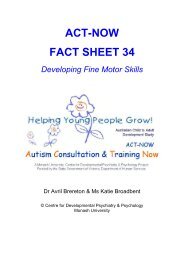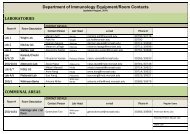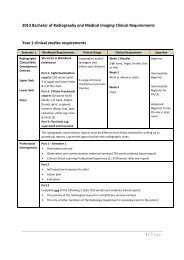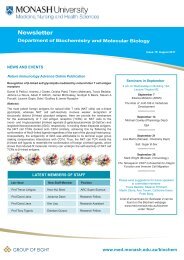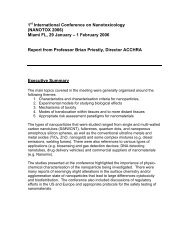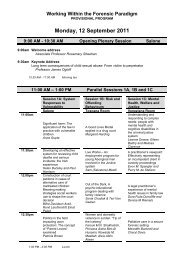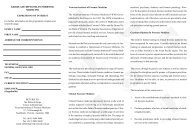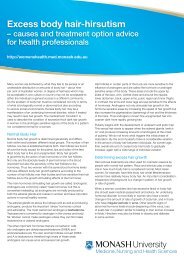Anxiety and School Refusal
Anxiety and School Refusal
Anxiety and School Refusal
Create successful ePaper yourself
Turn your PDF publications into a flip-book with our unique Google optimized e-Paper software.
<strong>Anxiety</strong> <strong>and</strong><br />
<strong>School</strong> <strong>Refusal</strong><br />
Am<strong>and</strong>a Dudley & Stephanie Rollings<br />
<strong>School</strong> <strong>Refusal</strong> Program<br />
Centre for Developmental Psychiatry<br />
& Psychology
Feeling<br />
anxious or<br />
constantly<br />
worrying?<br />
<strong>Anxiety</strong><br />
• <strong>Anxiety</strong> as a normal reaction<br />
e.g. Feel nervous/worried before an exam or public<br />
speaking.<br />
• <strong>Anxiety</strong> as a disorder<br />
- Intensity<br />
- Multiple symptoms<br />
- Length of time<br />
- Impairment
<strong>Anxiety</strong> Disorders<br />
• 15-20% childhood & adolescence<br />
• More common in females<br />
• Associated with depression<br />
• Increases with age<br />
• Long-term impact
MCommon <strong>Anxiety</strong> Signs <strong>and</strong> Symptoms<br />
Worry<br />
Emotions<br />
Apprehension<br />
Excessive shyness<br />
Physical<br />
Heart racing, shortness of<br />
breath, butterflies, nausea<br />
Headaches, stomach aches,<br />
diarrhoea, vomiting<br />
Sleep disturbance<br />
Behaviour<br />
Avoidance<br />
Distress<br />
Tantrums, crying<br />
Cognitive<br />
Expect bad things to happen<br />
Underestimate coping ability<br />
Trouble concentrating
<strong>School</strong> <strong>Refusal</strong><br />
• Definition<br />
– Severe difficulty attending school resulting in<br />
prolonged absence<br />
– Severe emotional upset<br />
– At home with parents‟ knowledge<br />
– Absence of antisocial characteristics<br />
– Reasonable efforts by parents to enforce<br />
attendance (Berg, 1997)
Common precipitants<br />
based on 41 SRP cases<br />
Bullying 32%<br />
Transition to high school 29%<br />
Legitimate absence due to illness 29%<br />
Family stress 15%<br />
Academic problems 12%<br />
Illness in others 10%<br />
Traumatic life event 7%<br />
Parent returning to work 7%<br />
Fear/difficulties with teacher 7%<br />
Change of school within yr 7%<br />
Divorce/separation 5%
<strong>School</strong> <strong>Refusal</strong>: Research<br />
• Cognitive - behavioural therapy<br />
• Less effective with adolescents<br />
• Medication as an adjunct<br />
• Our research
Cognitive-Behavioural Therapy<br />
THOUGHTS<br />
Everyone will ask<br />
me why I’ve been<br />
away<br />
I’ll never have any<br />
friends there<br />
I can’t catch up<br />
BEHAVIOURS<br />
Avoidance<br />
<strong>Refusal</strong> to get ready<br />
Crying, tantrums<br />
EMOTIONS<br />
<strong>Anxiety</strong>, Worry,<br />
Nervousness, Fear,<br />
Depression
Intervention with young person<br />
Aims:<br />
Learn skills for managing anxiety<br />
Return to school as soon as possible<br />
• Relaxation<br />
• Cognitive Therapy<br />
• Social skills training<br />
• Exposure
Unhelpful or negative thinking styles<br />
• Expecting bad things to happen<br />
People will give me a hard time about being away.<br />
• Focus on negative aspects of school<br />
I hate everything about school.<br />
• Regard unpleasant events as catastrophic<br />
What if someone sees me? I‟d die if that happened.<br />
• Underestimate ability to cope<br />
I won‟t be able to find anyone to sit with at lunchtime
Social Skills Training<br />
• Answering questions re: absence<br />
– Brainstorm possible responses<br />
– Combine with cognitive therapy<br />
– Practice through role-play<br />
• Assertiveness<br />
• Dealing with bullying<br />
• Joining in with a group<br />
• Inviting a friend to do something
Exposure to feared situation<br />
„Imaginal‟ – confronting situation through<br />
imagination, recalling situation through verbally<br />
describing the emotional details of feared situation<br />
„In Vivo‟ – facing situation through physically<br />
confronting feared situation<br />
Graded approach - hierarchy
Developing Attendance Plans<br />
• Choice in plan<br />
• Written down, detailed<br />
– arrival time, who, where, what to expect<br />
• Use of back-up plans, reset „goalposts‟<br />
• Avoid increasing expectations too early<br />
• Big picture = getting to school each day<br />
• Exposure is hard work
Role of Parents in Managing <strong>School</strong> <strong>Refusal</strong><br />
• Underst<strong>and</strong> anxiety <strong>and</strong> school refusal<br />
• Active management of school attendance<br />
(facilitating exposure)<br />
• Promoting a coping approach<br />
<strong>School</strong> <strong>Refusal</strong> = Fear / anxiety + Avoidance
Parent Strategies<br />
• United, consistent approach<br />
• Managing home environment<br />
• Smooth morning routine<br />
• Clear messages about school attendance
Vague messages about school attendance<br />
• Are you going to school today?<br />
• Don‟t worry. There‟s nothing to be scared of. It will all be OK.<br />
• Why are you doing this? You‟re upsetting the whole family.<br />
• Dad <strong>and</strong> I don‟t know what to do if you won‟t go.<br />
• If you can‟t get there today, it‟s only going to be harder<br />
tomorrow.
Clear messages about school attendance<br />
• I‟ve asked you already. It‟s time to get up for school.<br />
• Dad <strong>and</strong> I will do whatever we have to in order to get<br />
you to school.<br />
• We cannot allow you to remain at home.<br />
• I know this is hard but it has to happen. You have to go<br />
to school.<br />
• Today after school, we can go by the video store <strong>and</strong><br />
you can choose a movie to watch tonight.<br />
• You have five minutes to get dressed for school.
Parent Strategies<br />
• Planned ignoring<br />
• Modelling confidence<br />
• Escorting to school<br />
• Rewards for facing feared situations<br />
• Communicating with the school
<strong>School</strong> Intervention: The role of school & teachers<br />
• Underst<strong>and</strong> anxiety & school<br />
refusal<br />
• Provide warmth & support<br />
• Facilitate exposure plans<br />
• Promote a coping approach
What can schools/teachers do:<br />
• Underst<strong>and</strong> it is a complex problem<br />
• Notice absences immediately <strong>and</strong> act<br />
• Maintain contact with school<br />
- phone calls<br />
- email<br />
- home visits<br />
- meet at school
Talking with YP about school refusal<br />
• “I‟ve noticed you haven‟t been at school lately.”<br />
• “I‟m wondering about what is happening for you that<br />
is making it hard for you to get to school.”<br />
• “Tell me about……<br />
– friends<br />
– subjects<br />
– schoolwork<br />
– teachers<br />
– what is happening in the morning before school
What can schools/teachers do:<br />
• Identify concerns the YP has within the school<br />
environment:<br />
– Peers & bullying<br />
– <strong>School</strong> subjects (likes, dislikes, classwork)<br />
– Teachers<br />
• Provide strategies to deal with identified problems
Case Example of <strong>School</strong> Strategies:<br />
• P.E. teacher to meet YP & mum at tree near school gate<br />
• Graded exposure plans (back up: library)<br />
• Spent time alone in library to settle before entering class<br />
with a friend, commenced attending classes gradually<br />
• Quiet room set up for recess & lunch<br />
• Reward: extra time spent doing Art<br />
• Bag left in office<br />
• 2 designated people for him at school<br />
• No homework initially
Planning for school return<br />
• Identify other factors outside of school<br />
• Provide a mentor/teacher for YP<br />
• Curriculum modification<br />
• Dealing with running away<br />
• Avoid ultimatums<br />
• Share information with relevant teaching staff<br />
• Close communication with parents<br />
• Caution for high risk times (holidays)
Planning for school return<br />
• Identify factors outside of school<br />
• Provide a mentor/teacher for YP<br />
• Curriculum modification<br />
• Dealing with running away<br />
• Avoid ultimatums<br />
• Share information with relevant teaching staff<br />
• Close communication with parents<br />
• Caution for high risk times (holidays, illness)
In the classroom<br />
• Smile, welcoming <strong>and</strong> no reference to absences<br />
• Ensuring YP has someone to sit <strong>and</strong> work with<br />
• Provide structure <strong>and</strong> certainty<br />
• Reduce chance of “bad things” happening<br />
• Opportunities to experience success<br />
• Praise (adolescents - quiet & understated generally best)<br />
• Patience
Important principles for SR treatment:<br />
• Identify <strong>and</strong> intervene early<br />
• Exposure to school is key<br />
• Set plans to provide structure<br />
• Optimism <strong>and</strong> persistence
Useful References: <strong>Anxiety</strong><br />
• Rapee et al (2000)<br />
• Rapee et al (2008)
Useful References: <strong>School</strong> <strong>Refusal</strong><br />
• Wever, C. (2000)<br />
• Heyne & Rollings (2002)
Useful References: <strong>School</strong> <strong>Refusal</strong><br />
• Kearney, C (2008)
Useful Websites & Contact Numbers<br />
• Youth beyondblue www.youthbeyondblue.com<br />
• Mental health www.mentalhealthvic.org.au<br />
• ReachOut www.reachout.com.au<br />
• Headspace www.headspace.org.au<br />
• ADAVIC www.adavic.org<br />
• Kids helpline 1800 551 800<br />
• Parent line 13 22 89
For further information<br />
Tel: 03 9594 1300<br />
Fax: 03 9594 6333<br />
Email: am<strong>and</strong>a.dudley@med.monash.edu.au<br />
stephanie.rollings@med.monash.edu.au<br />
Website:<br />
www.med.monash.edu.au/spppm/research/devpsych/srp
Timeline<br />
(months)<br />
Assessment<br />
0<br />
CBT<br />
CBT &<br />
Fluoxetine<br />
CBT &<br />
Placebo<br />
* 12 sessions of<br />
CBT / 12 weeks<br />
medication<br />
3<br />
3 month Post TX Assessment<br />
6<br />
Monthly booster sessions (x3)<br />
9<br />
6 month Follow Up Assessment<br />
15<br />
12 month Follow Up Assessment



